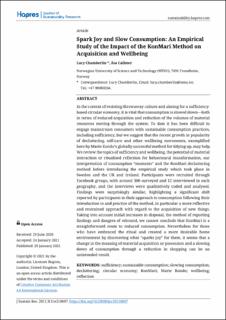| dc.description.abstract | In the context of resisting throwaway culture and aiming for a sufficiency-based circular economy, it is vital that consumption is slowed down—both in terms of reduced acquisition and reduction of the volumes of material resources moving through the system. To date it has been difficult to engage mainstream consumers with sustainable consumption practices, including sufficiency, but we suggest that the recent growth in popularity of decluttering, self-care and other wellbeing movements, exemplified here by Marie Kondo’s globally successful method for tidying up, may help. We review the topics of sufficiency and wellbeing, the potential of material interaction or ritualised reflection for behavioural transformation, our interpretation of consumption “moments” and the KonMari decluttering method before introducing the empirical study which took place in Sweden and the UK and Ireland. Participants were recruited through Facebook groups, with around 300 surveyed and 12 interviewed in each geography, and the interviews were qualitatively coded and analysed. Findings were surprisingly similar, highlighting a significant shift reported by participants in their approach to consumption following their introduction to and practice of the method, in particular a more reflective and restrained approach with regard to the acquisition of new things. Taking into account initial increases in disposal, the method of reporting findings and dangers of rebound, we cannot conclude that KonMari is a straightforward route to reduced consumption. Nevertheless for those who have embraced the ritual and created a more desirable home environment by discovering what “sparks joy” for them, it seems that a change in the meaning of material acquisition or possession and a slowing down of consumption through a reduction in shopping can be an unintended result. | en_US |

